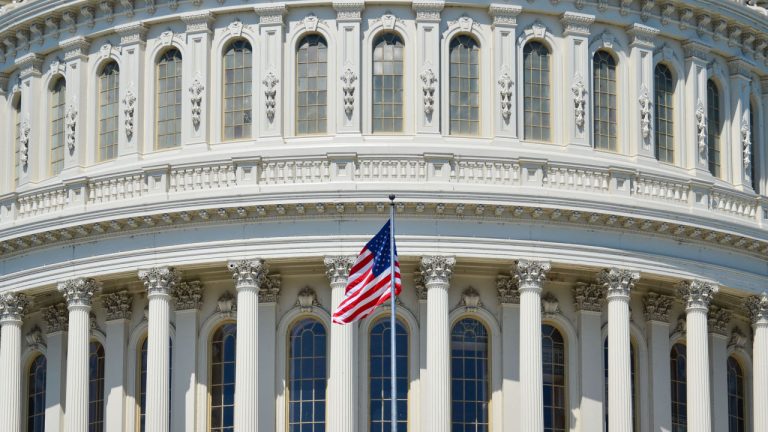
US Senator Elizabeth Warren has expanded support for her bill that aims to crack down on the use of digital assets in money laundering. Warren (D-Massachusetts), a longtime crypto critic, first introduced the Digital Asset Anti-Money Laundering Act at the end of 2022 and then reintroduced the 2023 version of the bill this past July. […]
The post Elizabeth Warren Expands Support for Digital Asset Anti-Money Laundering Crypto ‘Crackdown’ Bill appeared first on The Daily Hodl.
 U.S. Senators Jim Risch and Bob Menendez have reintroduced the “Accountability for Cryptocurrency in El Salvador Act,” known as the “ACES Act,” for discussion in the Senate. The piece of legislation seeks to examine the level of adoption of bitcoin as a legal tender in El Salvador and how this might affect the financial stability […]
U.S. Senators Jim Risch and Bob Menendez have reintroduced the “Accountability for Cryptocurrency in El Salvador Act,” known as the “ACES Act,” for discussion in the Senate. The piece of legislation seeks to examine the level of adoption of bitcoin as a legal tender in El Salvador and how this might affect the financial stability […] After the second largest bank failure in history, the U.S. Securities and Exchange Commission (SEC) is reportedly investigating First Republic Bank executives for allegedly engaging in insider trading. Two sources have claimed that the securities regulator is scrutinizing the bank’s executives for making trades using confidential information. Although the sources have not named any specific […]
After the second largest bank failure in history, the U.S. Securities and Exchange Commission (SEC) is reportedly investigating First Republic Bank executives for allegedly engaging in insider trading. Two sources have claimed that the securities regulator is scrutinizing the bank’s executives for making trades using confidential information. Although the sources have not named any specific […]
Binance responds to the letter from US senators alleging that the world’s largest crypto exchange by trading volume is a hotbed of illegal financial activities. In a letter dated March 1st addressed to Binance CEO Changpeng Zhao and Binance.US President Brian Shroder, Senators Elizabeth Warren, Chris Van Hollen and Roger Marshall said that the platform […]
The post Binance Addresses Accusations From Elizabeth Warren and Other US Senators in New Open Letter appeared first on The Daily Hodl.

Jon Tester is one of many Democratic senators slamming crypto of late, arguing that the sector is backed by nothing and provides nothing, so there's “no reason” why it should exist.
Another crypto-skeptic United States senator is on the loose, with Democrat Jon Tester boldly stating that he sees “no reason why” crypto should exist.
Tester is the senior senator of Montana and has held a seat there since 2007. He also serves on the Senate Banking Committee, which is one of the key players involved in the ongoing debate over U.S. crypto regulation.
During a Dec. 11 appearance on NBC’s Meet the Press, Tester argued that as crypto has no real value at all, the sector shouldn’t be regulated, as that would give it legitimacy.
“It's not been able to pass the smell test for me. I have not been able to find anybody who's been able to explain to me what's there other than synthetics [...] which means nothing,” he said, adding that:
“The problem is if we regulate it, and I pointed this out to some of the regulators here a week or two ago, if we regulated it, it may give it the ability of people to think it's real.”
In line with such thinking, Tester then went on to state that he sees “no reason why this stuff should exist” at all.
The crypto community wasn’t shy about slamming the senator's anti-crypto remarks and his self-admitted lack of crypto knowledge, with user @BS0064 sayingthat it's “always good to see people who have no idea what they’re talking about to express really strong opinions on the matter.”
Also, @blocknonprofit argued, “it is real… imagine all those cryptos are just tech stocks not traded on traditional exchanges used today.”
Tester’s most-recent testy comments come just a couple of weeks after he told media startup Semafor that the sector was “all bullshit” and that he can’t “figure out what supports it.”
Semafor’s Dec. 1 article was also littered with negative crypto stances from a bunch of Democrat senators, with crypto-hater Elizabeth Warren going in hard by noting: “finally, there are more people blowing the bullshit whistle.”
Bernie Sanders was at least more diplomatic, stating that he’s “not a big fan” of crypto.
Related: Senate Banking Committee Democrats warn SoFi about meeting its compliance deadline
Commenting on the article via Twitter, Semafor Washington editor Jordan Weissmann suggested that since the FTX debacle went down, “Dems suddenly feel free to say what they really think about the crypto industry.”
After FTX, it seems Dems suddenly feel free to say what they really think about the crypto industry.
— Jordan Weissmann (@JHWeissmann) December 1, 2022
Jon Tester told our reporter yesterday that he thinks the entire thing is "bullshit." Warren, Brown, and Sanders also had words. https://t.co/LzbCM9SkJD

In response to a letter from the U.S. calling on Facebook to halt its stablecoin and crypto wallet projects, Diem stated that it “is not Facebook. We are an independent organization”
Stablecoin project Diem has distanced itself from its Facebook in response to Democrat Senators calling for the immediate cessation of the firm’s Novi crypto wallet.
Diem also claimed senior regulators had called it “the best-designed stablecoin project that the U.S. government had seen.”
In an Oct. 19 letter sent to Facebook CEO Mark Zuckerberg, the Senators including crypto critic Elizabeth Warren, voiced their “strongest opposition to Facebook’s revived effort to launch a cryptocurrency and digital wallet.”
Earlier that day the Novi wallet was launched in partnership with Coinbase, with a pilot in the U.S. and Guatemala to enable users to buy, send and receive Pax Dollars (USDP) through their Novi account.
Diem’s response to the letter stated the Senators had misunderstood the “relationship between Diem and Facebook,” while also distancing itself from the Novi wallet pilot:
“Diem is not Facebook. We are an independent organization, and Facebook’s Novi is just one of more than two dozen members of the Diem Association. Novi’s pilot with Paxos is unrelated to Diem.”
While technically true, the argument may not be enough to squash the concerns of the U.S. Senators.
Diem was formerly known as Libra and has strong ties to the social media giant, as the stablecoin project was initially proposed by Facebook in 2017, and Facebook’s Financial Head David Marcus is also the co-founder and a board member of Diem.
In their letter, the Senators asserted that Facebook “cannot be trusted” as the firm has made several moves that ultimately “harmed its users and the broader society.” It also said there has not been “a satisfactory explanation for how Diem will prevent illicit financial flows and other criminal activity.”
Related: Top engineers working on Facebook’s wallet jump ship to A16z’s crypto fund
Diem defended itself by claiming it has the “most robust controls in the industry.”
“Beyond financial crime compliance, we engaged extensively with an inter-agency regulatory team about the design of the project. As part of that review, we made adjustments to reflect feedback we received, and we were informed by a senior regulator that Diem is the best-designed stablecoin project that the U.S. government had seen,” Diem said.
Diem concluded by saying that when the stablecoin project finally launches, it will do so with “confidence that Diem’s payment system is secure, will protect consumers, and will combat financial crime.”

The St. Mary’s University School of Law professor called for more scrutiny on the activities of miners, especially regarding their role in transaction ordering on the blockchain.
Tuesday’s crypto hearing before the United States Senate Committee on Banking, Housing and Urban Affairs also included a call for stricter regulations on cryptocurrency miners.
Addressing the committee, professor Angela Walch claimed that miners held “meaningful power” over the way blockchain networks operate. According to Walch, miners can exploit their role of transaction ordering, which could become a “major issue” for cryptocurrencies, as reported by Law360.
In stressing the point, professor Walch likened the miner extractable value paradigm — where miners earn more profits from ordering transactions in a certain way — as being akin to a “bribe.” As such, Walch called for “greater scrutiny” on the activities of miners, given their role as “intermediaries” in the multi-billion-dollar crypto ecosystem.
Coin Center executive director Jerry Brito countered Walch’s characterization of crypto miners as intermediaries, instead likening their role to that of internet service providers. Brito argued for miners to be treated like ISPs without the need for burdensome regulations like money transmission laws.
Brito highlighted places such as New York where the state’s stringent Bitlicense does not include crypto miners, as they are not deemed “financial intermediaries.”
Walch was not the only one to cast a seemingly jaundiced glance at crypto miners. Senator Elizabeth Warren used terms such as “shadowy” and “faceless” to describe software developers and miners.
Related: Regulators scrutinizing Tether’s commercial paper reserves: Comptroller of the Currency
With the U.S. identified as a likely destination for miners relocating out of China due to the latter’s crypto mining crackdown, the crypto mining space in the U.S. may be in for more serious scrutiny.
Most of the regulatory talk regarding U.S. miners has been about environmental concerns, with some North American mining firms expressing their commitment to environmentally sustainable operations.

The Consumer Safety Technology Act passed quickly in the House, and if enacted would require the study of blockchain tech and digital tokens.
A bipartisan bill that requires the study of blockchain technology and digital tokens passed the House of Representatives on June 22.
The “Consumer Safety Technology Act'' is centered on consumer protection and includes digital token and blockchain research. The bill passed the 117th Congress within a week of its introduction, with a resounding 325 votes in favor of, and 103 votes against.
This is not the first time this bill has reached this point however, and under the Trump administration, the bill passed the House in September 2020. It was then referred to the Committee on Commerce, Science, and Transportation before being shot down in the Senate.
Among other things, the bill calls for the Consumer Product Safety Commission to deploy a pilot AI program to aid consumer safety inspections, such as identifying consumer product hazards and tracking trends related to injuries involving consumer products.
Additionally, it calls for the Secretary of Commerce and the Federal Trade Commission (FTC) to “study and report on the use of blockchain technology and digital tokens.”
Democrat representative for California’s 9th district, Jerry McNerney sponsored the bill, which was co-sponsored by Democrat Darren Soto, along with Republicans Warren Davidson, Van Taylor, Michael Burgess, and Brett Guthrie.
The Consumer Safety Technology Act also includes two other bills touching on crypto. One is the Blockchain Innovation Act along with parts of the Digital Taxonomy Act which mandate the FTC report on “unfair or deceptive acts or practices in transactions relating to digital tokens.” Rep. Soto first introduced the latter bill in April 2019, but did not receive a single vote at the time.
Both bills are aimed at stopping deceptive acts related to crypto from individuals and “unscrupulous companies.”
Our #blockchain & #cryptocurrency bills with @RepGuthrie & @WarrenDavidson just passed the House as part of @RepMcNerney’s #ConsumerSafetyTechnologyAct. US must remain on the forefront of emerging technologies by fostering innovation & ensuring consumer protection. pic.twitter.com/vhI3FuVJJG
— Rep. Darren Soto (@RepDarrenSoto) June 22, 2021
Related: Will regulation adapt to crypto, or crypto to regulation? Experts answer
On the House Floor, Soto emphasized the importance of ensuring consumer protection from volatility and crim:
“When we look at market volatility, the use of cryptocurrency for ransomware, and recent attacks like the Colonial Pipeline and tax evasion, it’s critical that we get on the front end of this.”
The Blockchain Innovation Act requires the study of investment trends in the crypto industry, the potential risks and benefits of blockchain tech designed for consumer protection, and areas in which regulation could foster domestic innovation.